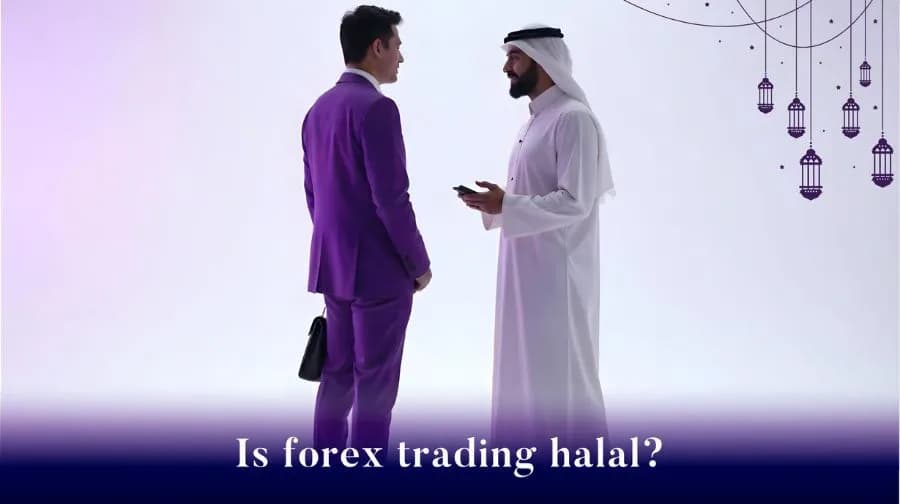Is Forex Trading Halal

Is forex trading halal or haram? Forex trading is one of the most actively traded markets in the world, influencing global economies and attracting millions of investors. Yet, for Muslim traders, a critical question arises: Is forex trading halal or haram? The answer is not always clear-cut, as it depends on how the trading is conducted and whether it aligns with Islamic financial principles. Traditional forex trading often involves elements such as interest, excessive risk, and speculation, which are prohibited in Islam. To address these concerns, Islamic trading accounts were developed—accounts designed to eliminate interest and promote ethical, Shariah-compliant trading. In this article, we’ll explore the conditions under which forex trading may be considered halal, what makes Islamic accounts different, and take a look at countries where forex trading is restricted or prohibited under Islamic law. Understanding these factors is essential for any Muslim looking to engage in the forex market responsibly and in accordance with their faith.
Let’s take a look at the Islamic law in forex trading
Muslims follow up with Sharia, a guide that helps them across various areas, including finance. The primary concerns include interest, risk, and gambling, all forbidden under Islamic law, and they question “Is forex trading halal in Islam?”. Below is a short explanation of each for better understanding.
-
Interest also known as Riba is strictly prohibited in Islamic Finance, as it creates income without actual productive effort. Forex trading involves leverage, where funds are borrowed to increase the trade volume and because there is an overnight interest charge (SWAP) on leveraged positions, it is considered as riba and raises the question of being allowed.
-
Risk and Gambling also known as Gharar and Maysir are considered prohibited in Islamic Finance because they take the control out of the seller's hand. The forex market on the other hand is highly volatile, most scholars consider this as a form of Gharar (risk) and the high-risking trading through leverage as a form of Maysir (gambling).
-
Some scholars are also against short selling, or profiting from a currency’s decline, because they believe it’s similar to betting against the market.
Despite all these points, forex trading can be permissible under certain conditions and rules.
Is There Islamic Forex Trading?
Yes, some financial platforms have managed to make this possible by making accounts that align with Islamic principles by removing interest-based transactions (SWAP free) or allowing direct ownership, thus making forex more accessible to Muslims. However, opinions vary on Islamic accounts of forex trading as well. While some scholars agree that as long as interest and extreme risk are avoided, forex trading can be allowable, others express concerns about potential risks, such as speculation which could violate Islamic principles. Ultimately, it is important for traders to consult with knowledgeable scholars and ensure their trading practices and actions align with Islamic teachings. This helps them to be sure that they are making ethical and permissible choices aligning with their beliefs in the financial markets.
List of Countries That Have Declared Forex Trading Haram
There are several countries including some Islamic countries that have banned or put restrictions on trading forex for different reasons. For example, countries like Pakistan or Iran restrict the forex market for retail traders due to high volatility and speculative nature, aligning it with the nation’s interpretation of Sharia law, or like in Turkey forex trading is limited to residents only and traders are enforced to lower leverage caps due to volatility and gambling-like risks. The same goes for China, retail forex trading is not legal and citizens can only work with offshore brokers if they want to trade, but even doing that can have consequences such as fines or other legal actions. The list goes on with names of different countries. Traders should be fully aware of the laws and regulations of the country they are residents of and the forex broker terms and conditions of trading because some brokers do not give services to specific countries.
Why Do Some Countries Declare Forex Trading Haram?
Whether forex trading is halal or haram is still an ongoing topic, several Islamic scholars have ruled that forex trading is haram, citing different reasons while some agreed on forex being permissible under certain restrictions and conditions. In 2023, Forex in the Eyes of Shariah: A Qualitative Analysis in the Malaysian Context was a research that surveyed the public whether forex investment is categorized as money betting or otherwise. Most respondents (72%) agreed with the statement while about 28% of respondents disagreed. This shows that most Muslims view forex investment as not moral. However, forex investment is different than betting.
Most Muslim countries have specific regulations to restrict forex trading and align it with Islamic law. For example, Saudi Arabian financial authorities are cautious about forex trading due to its unpredictable nature and leverage issues. Islamic Forex accounts are available in the Kingdom, but strict Sharia-compliance guidelines limit the range.
Why Forex Trading is Haram? A Matter of Perspective
Many scholars in Islamic countries view traditional forex trading as highly unpredictable and risky, often involving elements that are not permissible under Islamic law, such as interest (riba) and excessive speculation. However, the introduction of Islamic forex accounts has attracted significant attention and increased participation among Muslim traders. These accounts are specifically designed to comply with Shariah principles by eliminating interest-based transactions and avoiding overnight swap fees, which are typically charged in conventional forex trading. Additionally, Islamic accounts often operate without leverage or with limited leverage to minimize excessive risk. This approach aims to create a more ethically permissible trading environment for Muslim investors. Despite these adaptations, it remains essential for Muslims to consult a qualified religious scholar or authority before engaging in forex trading, as interpretations of Islamic financial principles can vary across different schools of thought and individual scholars. Personal guidance ensures adherence to one's faith.






